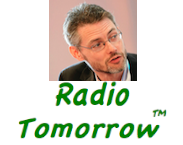Radio Tomorrow with James Cridland
I read a blog post recently saying that radio needs to be live or else it isn’t, really, radio. It reminded me of others who’ve said the same thing – that live is the essence of great radio.
They’re wrong. And here’s why.
Firstly, radio isn’t live. Yes, this is slightly pedantic, but actually, radio has a delay on every single platform you listen to – from FM’s near-instantaneous transmission to DAB or HD’s longer delay or IP’s delay which is longer still. I usually ask people what they consider to be live – is a 20 second delay still live? How about 25? Where does it cease being live and start being a delayed transmission? How does the experience change?
My definition of radio is, when talking about audio, “a shared experience with a human connection”. That means that Pandora isn’t what I call radio, because a personally random list of music tracks is not a shared experience in any sense of the word. But you’ll notice there’s no “live” there. Indeed, I don’t like the US’s misguided mantra of “live and local”, preferring “real and relevant” instead.
Serial, the hit podcast from a few years ago, clearly emphasised that great audio needn’t be “live” to be a shared experience. Serial was the discussion of workplaces, of friends in the pub. It started with, “What episode are you up to?”, so as to avoid any inadvertent spoilers; and then the theories began to be discussed. A shared experience, delivered using a download.
Indeed, there are plenty of precedents to show that a shared experience doesn’t need to be live. A movie. A great book. A fascinating magazine article. A YouTube clip. We probably all have a shared experience of the unalloyed joy of James Corden’s carpool karaoke; even though none of us saw it live.
Linear radio doesn’t need to be live. Indeed, I suspect the reason so much of radio is live is because of tradition, cheapness, and self-indulgence. Live radio means “well, we’ve run out of time”, and “I’m sorry, we appear to have lost our link to the Chancellor”, and “We’re sorry for the quality of that telephone line”. Live radio means a delay unit for swearing, a poor interview that could have been tightened up before broadcast, or, worse, an interview that should have been cut three minutes ago but the tyranny of the transmitter means we need to keep talking until the news, which has to be at the top of the hour because technology dictates a network switch at 00:00 and we have to fill to fit.
Live radio means producing content 24 hours a day, even though the typical listener tunes in for only 3 hours. Just imagine if you could focus all your content costs on three hours, instead of feeding a transmitter twenty-four hours a day. This transmitter mindset short-changes listeners: forced to accept an unedited, rough product instead of a well-edited, perfectly polished one.
As the next generation of listeners come to enjoy the highly post-produced sound of their favourite podcasts, live radio – already hampered with no skip button, no personalisation, no technical interactivity – will be seen increasingly as a poor option.
Far from being a requirement to be “proper radio”, the traditionalists’s love affair with “live” is dangerous: because it ends up hurting those we love the most: our audience, and our industry.
About The Author
 James Cridland is a radio futurologist: a writer, speaker and consultant on the effect that new platforms and technology are having on the radio business across the world.
James Cridland is a radio futurologist: a writer, speaker and consultant on the effect that new platforms and technology are having on the radio business across the world.
He writes for publications across the world, and runs media.info the worldwide media information website. He also runs a free weekly newsletter with news of radio’s future.
British by birth, James lives in Brisbane, QLD and is a fan of craft beer.


I like 'real & relevant'!.... As a 'live' freak from the 70's & 80's (Radio/TV/Music etc) I am passionate about doing 'live' anything.
With my wife we even host (MC) local council (pet & animal) events :-) How live can you get!?
But you struck a chord with 'polished podcast production' and 'skippable content' lines and the new generations of consumers.
Can only say the week I had planned (live) is now being re-planned... thanks James :-)
Not live? I'm a mere peasant who volunteers in community radio, I notice no delay between my console and what the listeners hear, if its there, its no doubt around 0.00000000000000005 ns
I often switch between air and monitor, since compressors often do the wrong thing and seemingly always to my fave tracks and I love the crispness that comes out the console ;)